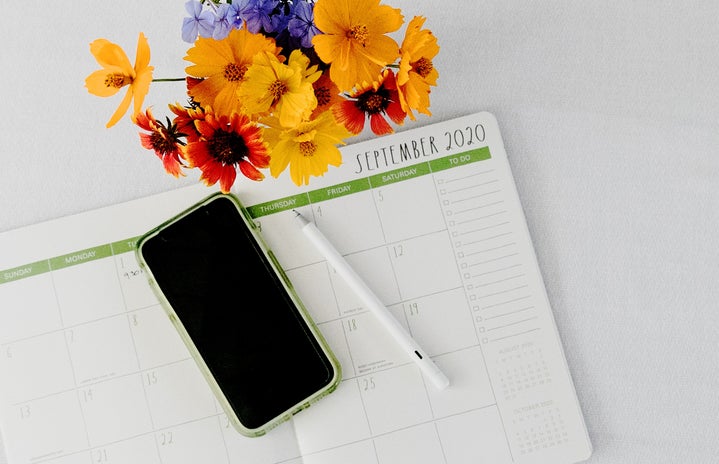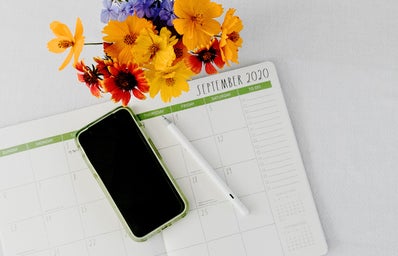Disclaimer: High-functioning anxiety is not an official medical diagnosis. The term “high functioning” does not mean that people with anxiety or other mental disorders can’t be successful. If you are experiencing symptoms of anxiety, text CONNECT to 741741.
I love calendars. I have an extensive and color-coded Google calendar that is accessible on every one of my devices, along with my Notion and physical planner. I have reminders for assignments that are due a month from now and I have a plan for my life and have had one since before college. Wow, you’re so organized. I wish I could be like that. But is it just being organized? Unfortunately, this obsessive need for calendars and reminders isn’t to be aesthetic or even to be successful; mainly it’s to stay sane.
During the summers in elementary school, I would print out a minute-by-minute schedule to follow for the days. It started at 8:30 a.m. sharp, not a minute later, of course. But I can’t remember being anxious about following that schedule. It wasn’t until I was older that I recognized this internal clock in me that I had to follow to a T. As a child of divorce, I spent my Sundays switching between my dad’s and mom’s house. I’d pack my stuff and drive 10 minutes, and then unpack. However, all day had to be dedicated to that because I had to make sure everything was in order for the week before I could try to do anything else. I thought I just loved feeling put together, but if we went to my mom’s later than we were supposed to or I forgot something, I would find myself feeling anxious, irritable, and unable to focus on anything else. If I was late for school or a doctor’s appointment, my whole day felt ruined. I often woke up earlier than I needed to in fear of sleeping too late and having to rush. I found it difficult to sit and relax with friends without the need to be doing something. My whole life, I had this nervousness about me that I never knew was a problem until I got to high school. It wasn’t the fact that I was just organized and punctual, but the fact I was struggling with anxiety, and it looked different.
I started therapy in eighth grade when my therapist told me I had anxiety. That was no surprise to me because of how social situations made me feel. Constantly over-thinking, I was shy with new people, obsessed over every little thing I said, and had the occasional panic attacks. But it wasn’t until I got medicated for Generalized Anxiety Disorder in 2019 that I realized my anxiety looked different than most. High-functioning anxiety describes someone who experiences anxiety but manages daily life well and seems put together and well-organized on the outside while struggling with worry and obsessive thoughts on the inside. Now, this isn’t to say that people who are diagnosed with anxiety cannot handle day-to-day life well and aren’t accomplished. This definition just highlights how this anxiety manifests. Anxiety looks different for each person who has it, whether that’s high functioning or being socially isolated, or having relationship anxiety.
Although my anxiety comes off as “successful” and “responsible,” it doesn’t mean it is a nice thing to have. It made it extremely difficult to handle changes in my routine, has caused me to get sick very often from the stress that my anxiety has put me through and be more prone to burnout. Everybody can have a specific thing that their anxiety manifests off from, whether it’s social situations, grades, cleanliness, or work. Every anxiety is valid, no matter what it is. I continue to struggle with my anxiety regarding schedules and calendars, but I also struggle with social anxiety. Tackling the constant fear and worry of anxiety is incredibly emotionally taxing. That’s why it’s important to find what helps ease your anxiety. It has taken me years (and I am still learning) to find what has helped me. It also took me going to a licensed therapist and being put on anxiety medication. Now, I have a mental “toolbox” of things that I know help calm my anxiety. Most of it is setting a routine that can’t be changed, such as making my bed, washing my face, and brushing my teeth. But I also have calming routines to help when unexpected change does arise. For me, this is creating a relaxing atmosphere with calming lights, lavender oil in my oil diffuser and watching a comfort show. Meditation and journaling are also useful resources that can help calm the physiological responses of anxiety.
If you are struggling with anxiety, there is help available to you. You do not have to suffer alone. You can reach out to CU’s own Counseling and Psychiatric Services or use Psychology Today to find a therapist who takes your insurance and works near you. There is help for you, you are never alone.


